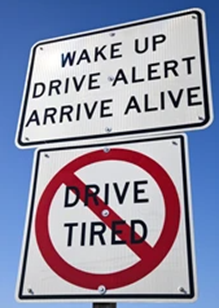Fatigue is one of the greater hazards on the road and can comprise a fleet financially, ethically, and legally.
According to the chain of responsibility and good management practice, it is not solely a driver’s responsibility to prevent drowsiness and fatigue while on the road but rather an organisation as a whole.
Fatigue goes beyond just feeling tired, it causes several adverse reactions such as a lack of alertness, an inability to concentrate, drowsiness, falling asleep, difficulty keeping your eyes open and blurred vision. On the road this can lead to drifting in and out of lanes, near misses, missing exits, and collisions with either roadside objects or other road users.
According to the Transport Accident Commission (TAC) roughly 20 per cent of fatal road accidents involve driver fatigue.

AfMA’s Fleet Management Guide outlines that anyone who influences on-road behaviour can be held responsible for those actions which impact on the safety of a transport task or activity.
The chain of responsibility ensures everyone who has control or influence over any transport task shares the responsibility of providing a safe and by the book workplace.
Legislation surrounding the chain of responsibility, driver fatigue and workplace health and safety demands that driver safety is ensured through scheduling sufficient breaks and rest stops to prevent incidents on the road.
Successful fleet managers create a culture in the workplace that focusses on doing the right thing, prevent pressure from being placed on workers and drivers that would encourage them to skip a rest stop, compromising their health and safety.



















